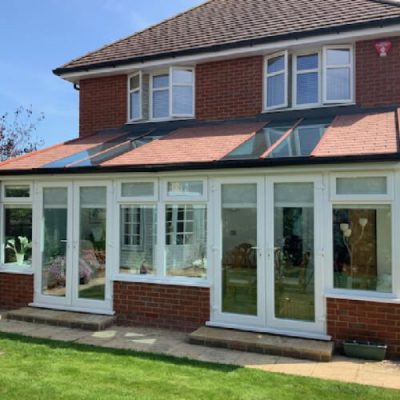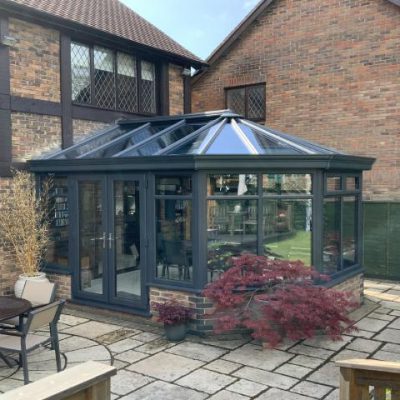Understanding UK Conservatory Building Regulations
Over the years, conservatories have become a popular addition to a house, with many homeowners extending out into their back gardens to create a space that is light and airy. These structures continue to be popular because they bring the outdoors into part of the house.
Before extending your home this way, it is important to understand conservatory building regulations and planning permissions.
Richard Thomas has been designing and building conservatories across Dorset for over 15 years, and in that time, we have gotten to know the relevant building regulations and planning permissions like the back of their hands. Here, we share what you need to know about conservatory construction rules.

What Are Conservatory Building Regulations?
Any new construction, be it a new home, an extension or a conversion, needs to meet building regulations. These are a set of standards and requirements that govern the construction and alteration of buildings to ensure the health, safety, welfare, and convenience of people in and around buildings. They cover various aspects such as structural integrity, fire safety, energy efficiency, accessibility, and ventilation.
Building regulations differ from planning permission as they cover internal and structural aspects such as foundations, insulation, fire safety, drainage, and electrical installations rather than the external design and aesthetics of the construction.
Your new conservatory will need to meet a set of conservatory regulations, as these will make sure that the construction is the same standard, if not better, than your existing house.
Key Conservatory Building Regulations
There are several key parts to conservatory building regulations.
Thermal Performance
Conservatory building regulations ensure that the structure is thermally efficient. This is important because so much of the structure is glass, there is a risk of low thermal efficiency and, therefore, high energy consumption.
Building regulations ensure that the right level of glazing is used and that the windows and doors will be fitted with specific materials and tools to enhance thermal performance.
Meeting these regulations will mean that you have a conservatory that is comfortable all year round without needing to use a large amount of energy to heat or cool it. This will save you money on your energy bills and reduce your household’s carbon footprint.
Structural Integrity
The last thing you will want is to invest money into this project and for the structure to fail.
Structural building regulations will set standards for the foundations, walls and roof of your conservatory so that you can be confident that it will last.
Not only will this provide confidence in the structure’s safety, but it will ensure that it is built to last a long time. Additionally, complying with building regulations will also enable you to get building insurance.
Electrical Safety
Of course, electrical appliances can be incredibly dangerous if not installed properly, which is why building regulations also set standards for electrical safety.
Complying with electrical building regulations in a conservatory ensures optimal safety for occupants and adherence to modern standards and can potentially result in insurance benefits.
Fire Safety
Conservatory building regulations ensure that residents of the house are safe should there be a fire.
These regulations cover the use of fire-resistant materials, the planning of safe escape routes and the implementation of fire alarms.
These regulations are very important to adhere to because not only will they keep you and your family, friends and guests safe, but they will ensure that your conservatory complies with legal regulations.
Ventilation
Adequate airflow and ventilation is the final aspect of conservatory building regulations. Like all the other aspects, this is vital in your conservatory as it will prevent condensation, moisture and mould from causing issues.
Additionally, it will keep a consistent flow of fresh air in the room, improving air quality.

Planning Permission vs. Building Regulations
The distinction between planning permission and building regulations is important because you don’t always need to apply for planning permission when extending your home.
This is because it can often fall under the permitted development rights. There are many ways that you can extend your home under this so that you won’t need to apply for planning permission.
However, no matter how you extend your home, you will always need to meet building regulations.

Advantages of Complying with Conservatory Building Regulations
While you must comply with conservatory building regulations, there are several benefits to it for you as a consumer.
- Safety and well-being – you can be confident that your conservatory is safe.
- Potential increase in property value – well-built conservatories often increase the value of the property.
- Avoidance of legal issues and fines – you won’t face any legal action or payments once your conservatory has been built.
- Improved energy efficiency and reduced bills – your conservatory will be energy and thermally efficient, meaning the space will be a consistent temperature for year-round usage without an increase in energy bills.
Navigating Conservatory Building Regulations
There is a lot to think about when it comes to conservatory building regulations. However, if you are stuck or confused, there are a few places that you can turn.
The first should be any professionals you are working with on the design or building of your conservatory. This would include architects, builders, and surveyors who have been part of the process.
You can also contact your local authority for their guidelines.
You must understand these regulations before you start building the extra space, so include details of how you will meet each regulation within your plans, and be sure to schedule enough time throughout the construction process to ensure each regulation is met.
Finally, keep a record of compliance for future reference.

Speak To The Experts At Richard Thomas
If you are overwhelmed by conservatory building regulations, don’t hesitate to get in touch with the experts at Richard Thomas.
We have been helping residents in Dorset, Hampshire, and Wiltshire extend their homes with conservatories, extensions and orangeries for over 15 years.
Our teams keep up-to-date with local and national building regulations, planning permission requirements and health and safety standards. As we specialise in home improvements, we are specialists in conservatory building regulations, so we can offer simple and easy-to-understand guidance.
Contact us for our assistance and to learn more about our services. Call us on 01202 488944 or complete our online contact form, and we will be happy to get in touch with you.

